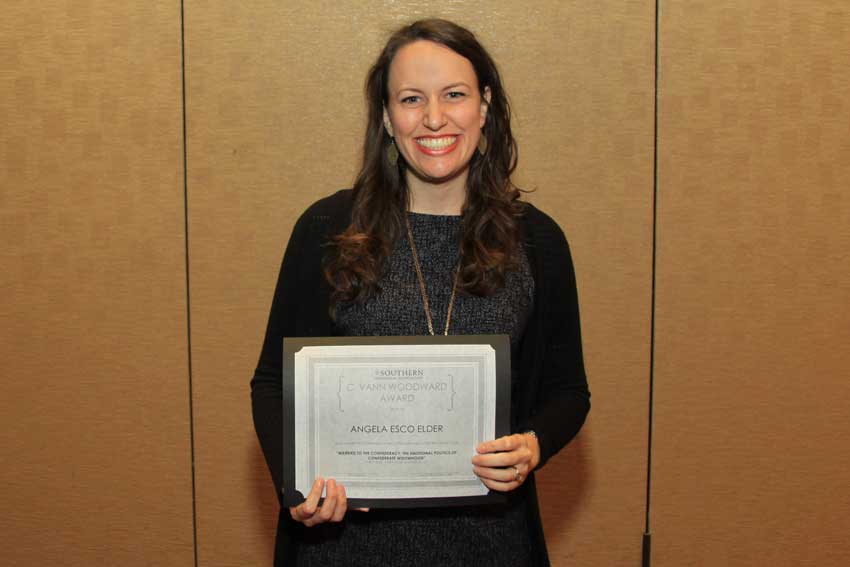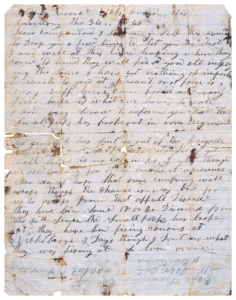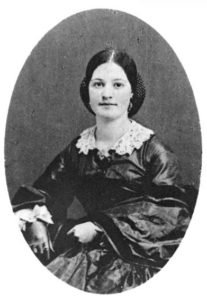Converse Professor Wins Award for Best Dissertation in Southern History

Converse College professor Dr. Angela Esco Elder is the winner of The Southern Historical Association’s 2017 C. Vann Woodward Award for the best doctoral dissertation in Southern history. Her dissertation, Married to the Confederacy: The Emotional Politics of Confederate Widowhood, was written under the direction of Dr. Stephen Berry at the University of Georgia. Elder also recently received the Melvin E. Bradford Prize from the St. George Tucker Society for the best dissertation written on any aspect of the American South.
“When we think of the Civil War, we often think of battles and generals. Reading the letters and diaries of women reveals a much more complicated experience.”
“I feel so honored to receive this award for my research. When we think of the Civil War, we often think of battles and generals. Reading the letters and diaries of women reveals a much more complicated experience,” Elder said. “Sharing these underrepresented stories is at the heart of my research, and to be recognized in my field for this work is both exciting and humbling.”
The Woodward award is given annually and includes a $3,000 stipend provided through a bequest left to the Southern Historical Association by C. Vann Woodward. The prize committee singled out Elder for her “rich archival research, judicious use of sources, and clear, concise expression.”
 Letter from Isaac B. Coleman, a drummer with the 30th Alabama Infantry, to his wife and later widow, Nancy Coleman.
Letter from Isaac B. Coleman, a drummer with the 30th Alabama Infantry, to his wife and later widow, Nancy Coleman.
In her dissertation, Elder examines the complicated emotional and political relationships between Confederate widows and the Confederate state. “Between 1861 and 1865, approximately three million men left for war; the war killed 750,000 of them. In the process, more than 200,000 white women became widows,” she said.
One of the major takeaways Elder sees in her project is the simple reality that Confederate widows existed. “This perhaps seems a redundant contribution, but with a historiography that has yet to produce a single published academic monograph devoted to widowhood in the Civil War, it is worth exploring why, and how, tens of thousands of women faded out of the narrative, out of the wartime experience, only to reappear in popular culture as Scarlett O’Hara.” Quite to the contrary, Elder’s analysis of these women’s experiences and the role they played is powerful enough to change the way we think about the Civil War household
“Throughout the American Civil War, Confederate newspapers and government officials championed a particular version of white widowhood—the young wife who selflessly transferred her monogamous love from dead husband to the deathless cause for which he fought. But a closer look at letters and diaries of widows reveals that these women spent their new cultural capital with great practicality and shrewdness. Even as their culture created an entire industry in their name, widows played the role on their own terms to forward their own ends. Precisely because society invested widowhood with so much significance, it inadvertently created the stage upon which an unforeseen and unprecedented number of young Confederate women could be seen and heard.”
The manner in which these women embraced their newfound social capital, and how they wielded this power, varied widely. “Though they shared a gender, women did not wound the same, work the same, nor share the same strengths and weaknesses, and these differences emerged particularly when their relationships were put under stress,” Elder said.
“It is worth exploring why, and how, tens of thousands of women faded out of the narrative, out of the wartime experience, only to reappear in popular culture as Scarlett O’Hara.”
Early in her research, she came across this quote, written by a widowed mother of two in her diary: Now I am a widow. Ah! That mournful word. Little the world think of the agony it contains! It was this sort of personal glimpse that drove Elder to piece together the broader stories of these women and the communities left to carry on with life. She became intimately familiar with their lives by pouring through unpublished archival material from nineteen institutions, including letters, newspapers, government records, photographs, telegrams, diaries, poetry, and songs. She also analyzed international sources, like British etiquette books; and material culture, like mourning gowns, hair jewelry, and grave markers.
“For some women, the loss of a husband was a traumatic experience from which they would never recover. A surprising number of women frantically dug up graves, lamented bitterly, clutched bodies, and demanded proof. The death of a husband had the potential to shatter a life and lifestyle, especially with the loss of financial, physical, and emotional support. It also had the perverse power to free women from abusive marriages and set them on a road to financial and psychological independence. Still, others lost partners they hardly knew, married in a heady patriotic rush to the altar at the start of the war. Confederate widows may have donned a black uniform of mourning, but their experiences were far from uniform.”
 Emilie Todd Helm, sister of Mary Todd Lincoln and widow of General Ben Hardin Helm, the last commander of the “Orphan Brigade”.
Emilie Todd Helm, sister of Mary Todd Lincoln and widow of General Ben Hardin Helm, the last commander of the “Orphan Brigade”.
Elder says her research clearly demonstrates that the personal is political, and the political is personal. “We don’t have to look far to see this still rings true today. Think about the two minutes, 11 seconds of thunderous applause Congress gave to Navy SEAL widow Carryn Owens back in February. Her husband, Ryan Owens, died during the second weekend of the Trump presidency, in a much-criticized raid in Yemen. Ryan Owens’ father called for an investigation into the raid, and said he wanted President Trump to stop ‘hiding behind son’s death.’ But Carryn, as Ryan’s widow, attended Trump’s first address to Congress. There, he acknowledged her in what some reporters have called the ‘emotional highpoint’ of the speech. Likewise, during the American Civil War, politicians paid a tremendous amount of attention to widows. If a widow could support the cause that killed her husband, that was a powerful endorsement. But, if she said no, enough is enough, send home my father, my brother, my male cousins, this cause is not worth so great a sacrifice – that was a powerful indictment. Confederate widows, though they might be as young as 17, 18, 19, had a tremendous amount of social capital, and their societies were anxious to oversee how they spent it.”
Elder’s dissertation research was supported by multiple grants and took her throughout the Southeast. After graduating from the University of Georgia with a Ph.D in History, she became the Virginia Center for Civil War Studies postdoctoral fellow at Virginia Tech. Dr. Elder joined the Converse College faculty this year as assistant professor of history. Having quickly gained the admiration of students and faculty alike at Converse, she teaches a variety of American history courses, including her specialty in the Civil War and women’s history, and unique courses like Duels, Disease, and Disaster: Death in 19th Century America.
“In replacing a nationally known scholar, teacher, and beloved peer in our department, Angela had big shoes to fill,” said Dr. Joe P. Dunn, chair of the Department of History and Politics. “As scholar, teacher, and colleague, we hit a homerun though as Angela has already demonstrated superstar capabilities. We are very fortunate to have her.”
About the Southern Historical Association
The Southern Historical Association was organized on November 2, 1934 and charged with promoting an “investigative rather than a memorial approach” to southern history. Its objectives are the promotion of interest and research in southern history, the collection and preservation of the South’s historical records, and the encouragement of state and local historical societies in the South. As a secondary purpose, the Association fosters the teaching and study of all areas of history in the South. The Association holds an annual meeting, usually in the first or second week of November, and publishes The Journal of Southern History
About C. Vann Woodward
Comer Vann Woodward is widely regarded as one of the most influential historians of his generation. Martin Luther King Jr. called his Strange Career of Jim Crow (1955) “the historical bible of the Civil Rights Movement.” Woodward won the Pulitzer Prize for History in 1982 for Mary Chesnut’s Civil War.